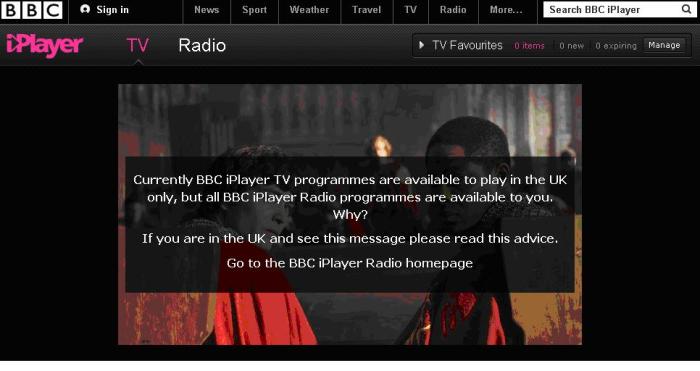In the definition of Open Educational Resources openness is defined as accessibility without borders, the possibility to use, re-use, remix and redistribute the resources without (extreme) limitations other than defined by Creative Commons copyrights.
Two problems, both related with nationalism, can restrict the global accessibility of OER. The first problem I encountered was when I wanted to watch a replay of a British series I missed at the BBC broadcasting. There is, however, the possibility to watch programs which had been broadcasted at the open net, the BBC iplayer. The screen-print below shows that for non-UK watchers it’s is not possible to watch replays. We encountered a similar problem when we wanted to change from one TV-provider to another. The new provider could not offer BBC1 and BBC2, a problem which was solved by raising the fees. Both problems were caused by the fact that public television
is financed by national taxation, whereby the government decided that it is only offered free to the people who paid for the production of the TV-programs. The rest of the world has to pay to see those programs.

In the case of Open Access and Open Educational Resources, it seems that the British government takes another approach. With respect to open access, the government has taken the decision that work, paid for by the British taxpayer will be free available online for universities, companies and individuals, to use for any purpose, wherever they are in the world (The Guardian, 15 July 2012 ). To make this possible, the government changes the business model of scientific publishers from being paid by the subscribers of their journals to making the authors pay an ‘Article Processing Charge’ (APC) around £2,000 per article. This APC is financed by the research funds of universities and research institutions (the so-called Golden approach, commission Finch; contrasting the Green approach). Note however, that the statement makes an explicit relationship between the British taxpayer and the users wherever they are in the world! Martin Weller writes about Open Access: “Ironically, openness may lead to elitism. If you need to pay to publish, then, particularly in cash-strapped times, it becomes something of a luxury”.
The European Commission seems to follow the UK’s example in proposing a similar approach for all work funded by EU programs.
Neelie Kroes invites scientific community to stimulate Open Access
Speech of Neelie Kroes for the Open Education Week Event in Delft
The two YouTube movies show the European Commissioner Neelie Kroes speaking first on Open Access, then on Open Educational Resources. In general, the UK government does support this EU-policy, in the Netherlands the government seems to slow down expenditures on OER, im Ireland and Germany there seem to be legal problems (see the OECD report)
Another problem is that national governments provide tax money to develop OER in national languages. This will lead to a fragmentation of the global available materials. For example, the amount of OER materials published in Turkish or in Chines is impressive. At the Chinese Quality Courses Project about 20.000 courses are available, whereas this is only one of the 15 mentioned OER projects. At Anadolu University in Turkey, Yunus Emre: New Generation Learning Portal (http://yunusemre.anadolu.edu.tr/) is an OER initiative to disseminate the instructional materials used in the University’s distance courses. It launched in 2008 by Open Education Faculty and the Yunus Emre portal currently there are materials related to total 153 courses in 20 subject areas. Since January 2008 total 6.792.031 different individuals, 49.054.080 times entered the portal. Next to this, Anadolu University has initiated the ANAPOD project, inspired on iTunes, providing complete course materials (text, video, audio) belong to 54 courses created by 36 faculty members. Also production of materials for 93 courses is still in progress (source: http://linc.mit.edu/linc2010/proceedings/session10Aydin.pdf).
 Website of the Quality Courses Project in China
Website of the Quality Courses Project in China
![]() Open Education pages at Anadolu University
Open Education pages at Anadolu University
So, there are initiatives, small or large in Russia, Portuguese, and other languages. This opens up educational possibilities for people not in a possibility to reach good quality education; or as stated by UNESCO: “ODL approaches and ICTs present opportunities to widen access to quality education, particularly when Open Educational Resources are readily shared by many countries and higher education institutions” (UNESCO, Paris, 5-8 July 2009). However, language barriers will limit these opportunities to native speakers.
Is this a problem? It is if this means that these two restrictions again limit access to education to the better endorsed countries which are capable of providing free educational resources for their population, excluding others either through restricting internet access or by language barriers.
